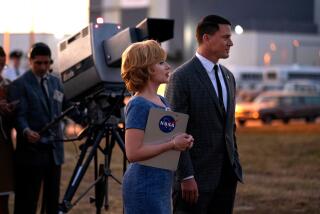Review: Eva Green is at her best in the deeply stirring astronaut drama âProximaâ
At the beginning of âProxima,â a beautifully human-scaled movie about a great leap into the unknown, Sarah (Eva Green), a French astronaut, undergoes a series of intense physical tests in preparation for her first voyage into space. Itâs a grueling regimen, but Sarah, who is Mars-bound, has been training for it her whole life: She squeezes her lean, limber body through tight spaces and into mechanical constraints as required, her eyes signaling both natural ease and total concentration. Later at home, running and playing with her 7-year-old daughter, Stella (ZĂŠlie Boulant-Lemesle), she seems to be undergoing a different kind of test, steeling herself for a year away from the most important person in her soon-to-expand universe.
A little while later, Sarah will meet the other astronauts who will join her on the International Space Station, including an American, Mike (an excellent Matt Dillon), who introduces her to a small crowd with a boorish crack about French women being good cooks. Sarah, a dab hand at deflecting sexism and maintaining her professional composure, takes the microphone and expresses her excitement at being on board. In these opening moments, the writer-director Alice Winocour effectively lays out her territory: not the grand vastness of outer space but rather the human obstacle course that Sarah must navigate first and all the expressions of polite respect, gentle concern and barely concealed scorn she must endure along the way.
Sound mundane? It isnât. By focusing so closely on the planning stages, âProxima,â which Winocour wrote with Jean-StĂŠphane Bron, somehow suggests more about the physical and psychological dislocation of space travel than many pictures that blast off right from the get-go. This is partly because of the intense realism of the filmâs entirely on-location shooting (by the cinematographer George Lechaptois), which takes us inside the European Space Agency in Cologne, Germany, and the facility in Russiaâs Star City, where Sarah, Mike and another member of their crew, Anton (Aleksei Fateev), go to complete their training.
We are with Sarah, really with her, at every step, whether sheâs being hurled about in a human centrifuge or having to move swiftly underwater in a heavy spacesuit â physical trials that Winocour captures with matter-of-fact realism and otherworldly strangeness. At one point, Sarahâs body is fitted for a mold that will be used to construct her seat on the rocket, allowing for the significant changes she will undergo during the mission. (âIâm becoming a space person,â she murmurs in voiceover, as the molding material is poured around her.)
In her earlier features âAugustineâ and âDisorder,â Winocour demonstrated a gift for sensory filmmaking, for bringing the audience into an intimate, tactile understanding of her charactersâ physical and psychological states. She accomplishes something equally evocative here, and the achievement isnât hers alone. Green, often typecast as witches and femmes fatales, here takes on a too-rare leading role devoid of any such fantastical trappings and emerges with one of the strongest performances of her career. The athletic demands are formidable, but they are more than matched by the emotional ones: Green achieves an especially moving rapport with the young Boulant-Lemesle, terrific as a girl whoâs frightened at losing her mom for a year â or forever, should something go horribly wrong.
Sarah is hardly the first movie astronaut to confront feelings of guilt over leaving children behind on terra firma, as her fellow voyagers in âFirst Man,â âAd Astraâ and âInterstellar,â among others, can surely attest. Those other protagonists, of course, were men, and within even the remarkable, rarefied field of space travel, Winocour subtly pinpoints an all-too-unremarkable double standard. An astronaut like Mike may think nothing of having his wife (Nancy Tate) take care of their sons for a year. Sarah, however, is made to feel the particularly heavy weight of her decision. Itâs there in the mix of support and resentment she gets from Stellaâs astrophysicist father (Lars Eidinger) or in the guilt-tripping questions asked by Wendy (Sandra HĂźller), a psychologist preparing mother and daughter for long-term separation.
None of these characters is treated as a cardboard antagonist. Even Dillonâs Mike, who at one point condescendingly asks Sarah if she wants to lighten her training load, is shown to have his redeeming qualities. Winocour shows us smart, sometimes insensitive and fundamentally decent people navigating an extraordinary situation and the sacrifices that are made in service of a grand collective undertaking.
The science of space travel demands precise calculations, coolly and unerringly executed. But the business of being human is messier, more ambiguous and infinitely harder to control. At the launch center in Baikonur, Kazakhstan, Sarah and her crew mates are placed under strict quarantine, isolating her from Stella during what will be their last moments together for a long time. But in those crucial moments, Winocour allows her characters a fleeting moment of grace, a respite that will sustain them through the trials of this world and the next.
âProximaâ
(Not rated)
(In English and French with English subtitles)
Running time: 1 hour, 47 minutes
Playing: Available Nov. 6 on VOD platforms
More to Read
Only good movies
Get the Indie Focus newsletter, Mark Olsen's weekly guide to the world of cinema.
You may occasionally receive promotional content from the Los Angeles Times.











